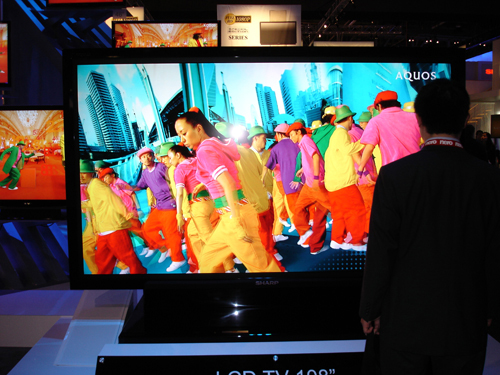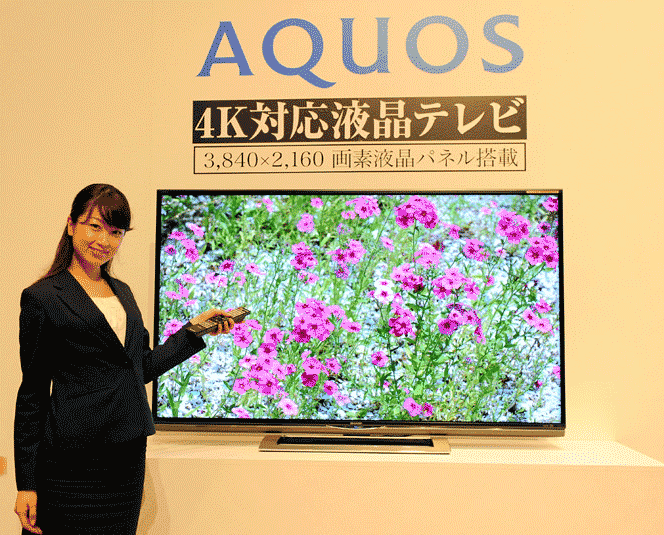 We’ve been reporting for a while now on the epic survival struggles of some of this industry’s biggest brand names in Japan…most recently Sharp Corp. Some of the changes we’re seeing now were unforeseeable even 24-36 months ago – Sony spinning off divisions, JVC Kenwood pulling out of the consumer business, Pioneer first shutting down A/V, then selling that division to Onkyo, Toshiba pulling out of TV biz, Panasonic dropping consumer business, and on and on…
We’ve been reporting for a while now on the epic survival struggles of some of this industry’s biggest brand names in Japan…most recently Sharp Corp. Some of the changes we’re seeing now were unforeseeable even 24-36 months ago – Sony spinning off divisions, JVC Kenwood pulling out of the consumer business, Pioneer first shutting down A/V, then selling that division to Onkyo, Toshiba pulling out of TV biz, Panasonic dropping consumer business, and on and on…
Now a reporter for the respected Bloomberg View asks, “…why Sharp should still be in business?”
See more on this surprising declaration and criticism of the practices of Japan, Inc…
In a story appearing in The Japan Times, Bloomberg View columnist William Pesek, who is based in Tokyo, wrote an opinion piece in which he argued that Japan’s big banks should stop supporting poorly managed, weak companies and just let them fail…starting with Sharp. The piece was critical of Sharp (a 100+-year-old brand)…but even more so of the way the system in Japan perpetuates failing companies.
Pesek noted some of the company’s more positive contributions to the world – like inventing the first transistor calculator (1964) and the first commercial camera phone (1997), whose introduction was “inspiring Steve Jobs in California.” Sharp, he added, “was among the core engines of the nation’s global ambitions” as Japan moved from a feudal state to a capitalist power.
Slammed in the centennial…
But in 2012, the year of their centennial, Pesek noted that the company celebrated by registering the worst financial performance it its history – losing nearly $5 billion. And, after largely “cosmetic” restructuring efforts, the company is expected to lose $251 million this year.
Pesek is brutal in his assessment of company plans. Sharp TVs “struggle to compete” with the world’s other TV manufacturers…and display panels “show little promise” with “voracious” competitors afoot there as well. How, he asks, will Sharp sell “smartphone panels to China’s handset makers” when the China mainland suppliers “can make high-quality ones at lower prices[?]”
Why not sell off solar?…
Upon hearing that Sharp was officially denying reports that they were about to sell their money-losing solar panel business, Pesek quipped, “That begs the question why not. As I say, why is Sharp still with us?”
Sharp only survives, Pesek suggests, because of the unique market economy in Japan. Many business analysts over the years decry Japan’s cozy business/government/banking relationships – too cozy, they say.
Lost their way…
In Pesek’s opinion, Sharp has “over-expanded, lost track of core competencies and grown complacent thanks to ready support from banks.” Banks bailed out the company in 2012 “only to lose $8 billion over the next two years.”
Ironically, the very market economy that Pesek criticizes for keeping failed companies afloat, led to the creation of an entity that is killing Sharp – the Innovation Corp. of Japan (INCJ). This group, a government created entity (the Ministry of Economy, Trade and Industry of Japan, aka METI) was launched to “boost the nation’s entrepreneurial capital and competitiveness.” But really, it’s just a “partly taxpayer-funded entity…bailout mechanism for failed projects.”
The system giveth…the system taketh away…
One of INCJ’s projects was to mash together money-losing display resources from Sony, Toshiba and Hitachi into a more efficient display making powerhouse. The government then took steps to steer “lots of iPhone business to the new company.” And just who lost the most in this deal with a new and seemingly formidable competitor? Why, Sharp Corp. of course.
Now we learn that Sharp is “considering ‘drastic reform,’ including cutting executive pay by as much as 20 percent (a tired Japan Inc. maneuver that makes great headlines, but changes nothing).” And, as we reported recently, hitting up Japan’s banks…once again.
A great place to start…
Pesek suggests its time for Japan, Inc. to stop floating the failed business models of these failing companies. He argues forcefully that it is high time for Japan to allow the effects of “creative destruction” to take hold – allow these aging giants to come crashing down…so that the green shoots of newer, more innovative companies can rise up.
Sharp, he says, “is a great place to start.”





Leave a Reply